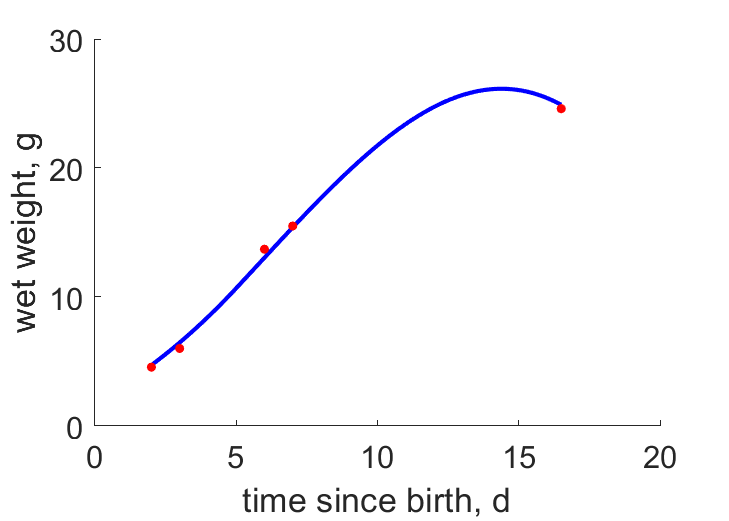Predictions & Data for this entry
| Model: std | climate: Dfb | migrate: Ms | phylum: |
| COMPLETE = 2.5 | ecozone: THn | food: biCi, biHn, biHs | class: |
| MRE = 0.035 | habitat: 0iTf | gender: Dg | order: |
| SMSE = 0.002 | embryo: Tnpf | reprod: O | family: |
Zero-variate data
| Data | Observed | Predicted | (RE) | Unit | Description | Reference |
|---|---|---|---|---|---|---|
| ab | 13 | 13.99 | (0.07638) | d | age at birth | avibase |
| tx | 18 | 18.14 | (0.00805) | d | time since birth at fledging | avibase |
| tp | 54 | 49.89 | (0.07619) | d | time since birth at puberty | guess |
| tR | 365 | 365 | ( 0) | d | time since birth at 1st brood | avibase |
| am | 2409 | 2463 | (0.02262) | d | life span | avibase |
| Ww0 | 2.66 | 2.507 | (0.05761) | g | initial wet weight | avibase |
| Wwi | 28.9 | 30.46 | (0.054) | g | ultimate wet weight | avibase |
| Wwim | 32.6 | 32.76 | (0.004879) | g | ultimate wet weight for males | avibase |
| Ri | 0.01096 | 0.01065 | (0.02779) | #/d | maximum reprod rate | avibase |
Uni- and bivariate data
| Data | Figure | Independent variable | Dependent variable | (RE) | Reference |
|---|---|---|---|---|---|
| tW |  | time since birth | wet weight | (0.02618) | JohnHend2020 |
Pseudo-data at Tref = 20°C
| Data | Generalised animal | Leucosticte australis | Unit | Description |
|---|---|---|---|---|
| v | 0.02 | 0.03429 | cm/d | energy conductance |
| p_M | 18 | 566.8 | J/d.cm^3 | vol-spec som maint |
| k_J | 0.002 | 0.02325 | 1/d | maturity maint rate coefficient |
| k | 0.3 | 0.3016 | - | maintenance ratio |
| kap | 0.8 | 0.9705 | - | allocation fraction to soma |
| kap_G | 0.8 | 0.7967 | - | growth efficiency |
| kap_R | 0.95 | 0.95 | - | reproduction efficiency |
Discussion
- Males are assumed to differ from females by {p_Am} only
- mod_1: Pseudo-data point k is used, rather than k_J; Data set tp and parameter t_R are added, the latter replacing clutch interval t_N. Postnatal T is based on PrinPres1991, see get_T_Aves. See further the revision page, theme puberty
Bibliography